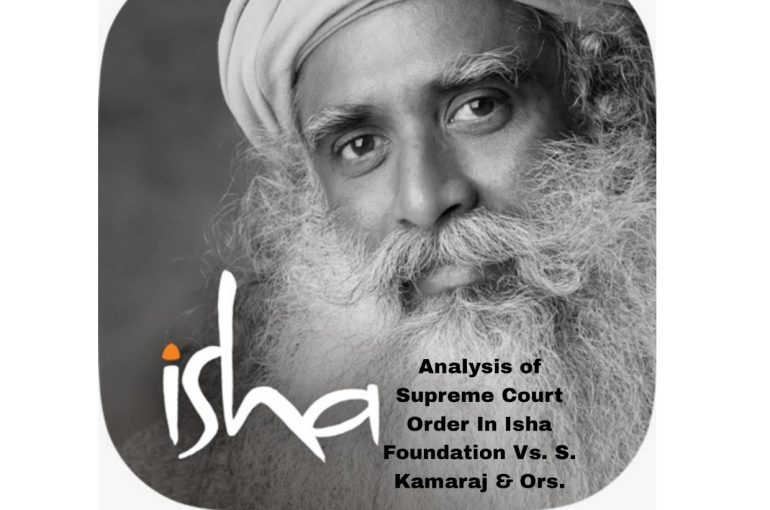ANALYSIS OF SUPREME COURT ORDER IN ISHA FOUNDATION VS. S. KAMARAJ & ORS
ANALYSIS OF SUPREME COURT ORDER IN ISHA FOUNDATION VS. S. KAMARAJ & ORS.
The case under discussion is the Special Leave Petition (Crl.) No. 13992/2024, which originated from the judgement dated September 30, 2024, in Habeas Corpus Petition (HCP) No. 2487/2024. The matter originated as a Special Leave Petition (SLP) under Article 136 of the Indian Constitution, challenging the High Court of Madras’s Order dated September 30, 2024, in Habeas CorpusPetition (HCP) No. 2487 of 2024.
Background of the Case
The legal dispute began when S. Kamaraj, the father of two adult daughters, Geeta Kamraj and Lata Kamraj, filed a Habeas Corpus Petition under Article 226 of the Constitution before the Madras High Court. He alleged that his daughters were being held against their will at the Isha Foundation’s premises in Coimbatore, Tamil Nadu. The High Court interacted with the daughters and directed the Coimbatore Rural Police to conduct an inquiry into the allegations, seeking a status report regarding the conditions at the Isha Foundation and the daughters well-being.
However, Isha Foundation moved the Supreme Court against this Order of the Madras High Court dated September 30, 2024. They argued that the daughters were staying at the Foundation voluntarily and without any coercion. They also challenged the High Court’s decision to entertain a second Habeas Corpus Petition on the same matter.
Proceedings in the Supreme Court
The case was heard by a Bench comprising the Chief Justice of India, Justice J.B. Pardiwala, and Justice Manoj Misra. The Court had earlier issued an interim order on October 3, 2024, transferring the Habeas Corpus Petition to itself and allowing further proceedings to be conducted through video conferencing, considering the sensitive nature of the matter.
Supreme Court’s Observations
During the proceedings, the Supreme Court interacted directly with the daughters through video conferencing. It noted the following key points from this interaction:
1) Voluntary Stay: Both Geeta Kamraj and Lata Kamraj, aged 39 and 42 respectively, stated that they joined the Isha Foundation when they were 24 and 27 years old. They clarified that they were residing at the ashram of their own free will and had not been coerced into staying there.
2) Freedom of Movement: They mentioned that they were free to leave the ashram whenever they wished and had even travelled outside the premises on multiple occasions. For instance, one of the sisters participated in a 10-kilometer marathon in Hyderabad, further indicating their autonomy.
3) Relationship with Parents: The daughters also emphasised that they maintained regular contact with their parents, who visited them at the ashram. They expressed concern that their father’s actions and public statements were causing them distress.
Status Report by Coimbatore Police
The status report filed by the Superintendent of Police, Coimbatore, provided insights into the inquiry conducted following the High Court’s directive. The report included:
a) Statements from the daughters affirming their voluntary residence at the Isha Foundation.
b) Details of phone call records between the daughters and their parents, showing ongoing communication.
c) Verification by the Police that both women were in good physical and mental health.
4) Observations from the Assistant Superintendent of Police, who conducted interviews with the daughters, indicating their satisfaction with life at the Foundation.
5) The report also addressed concerns raised by S. Kamaraj about the daughters’ well-being and nutrition, with evidence from their written submissions stating that they were neither under any pressure nor facing neglect.
Legal Reasoning and Supreme Court’s Decision
The Supreme Court’s judgement rested on the principles governing Habeas Corpus Petitions. Under Article 226 of the Constitution, the purpose of a Habeas Corpus Petition is to ascertain whether a person is being unlawfully detained. In this case, the Court observed that:
1) Both individuals were of legal age when they joined the ashram and were capable of making their own decisions.
2) A similar Habeas Corpus petition had been filed by the mother of the daughters eight years ago, with the same outcome that the daughters chose to stay at the Isha Foundation voluntarily. The Court reasoned that entertaining a second Habeas Corpus Petition in such a context was unwarranted.
3) The interaction with the daughters confirmed that they were not held captive or under any undue influence, which fulfilled the primary purpose of the Habeas Corpus Petition.
Based on these findings, the Supreme Court concluded that the continuation of the Habeas Corpus Proceedings was unnecessary. It ordered that:
i) The Habeas Corpus Petition No. 2487 of 2024 would be deemed closed, as the concerns raised by the Petitioner had been satisfactorily addressed.
ii) The Coimbatore Rural Police’s status report would remain on record, but the Police were directed not to take any further action based on the High Court’s earlier order, except for submitting the report to the Supreme Court.
iv) The Court clarified that the closure of the Habeas Corpus Proceedings did not exempt Isha Foundation from any other legal or regulatory obligations.
Conclusion
The Supreme Court’s decision in Special Leave Petition (Crl.) No. 13992/2024, concerning the Isha Foundation, provides a significant precedent on the scope and application of Habeas Corpus Petitions. By focusing on the voluntary nature of residence and the rights of adults to choose their living arrangements, the Court emphasised the principles of personal autonomy and procedural integrity. The judgement not only concluded a contentious legal issue but also reinforced the boundaries of judicial intervention in matters concerning individual liberty and familial disputes.
Shikha
Associate
The Indian Lawyer @ Allied Services





































Leave a Reply